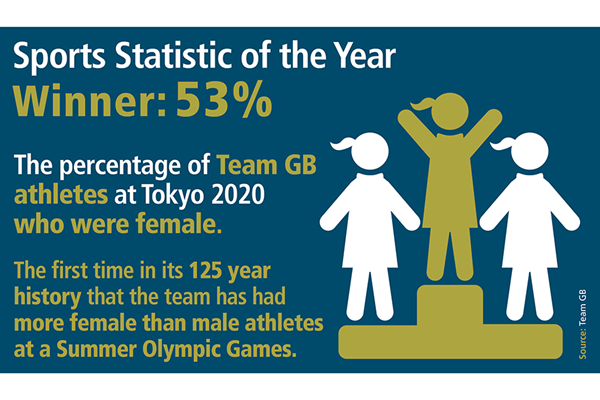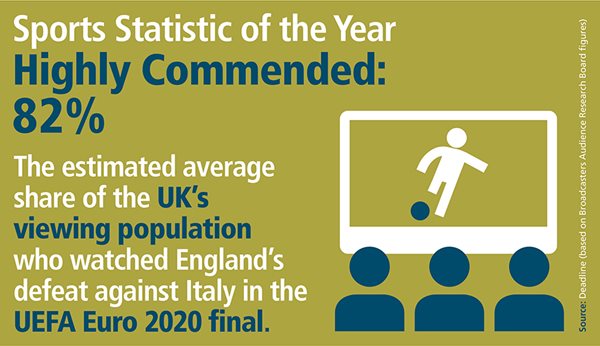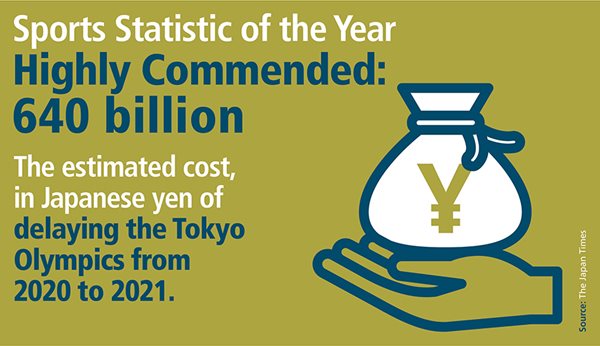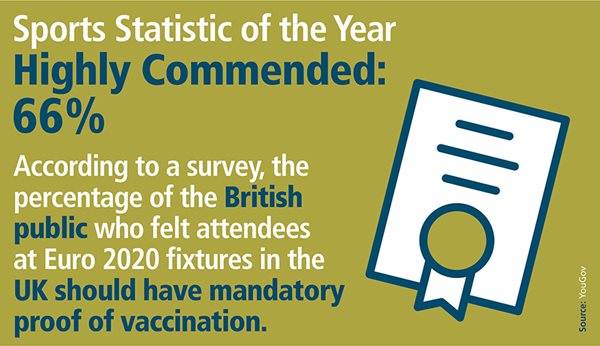We're pleased to announce our first ever Sports Statistic of the Year. Chosen by our Statistics in Sport Section, this year's initiative follows on from previous RSS Statistics of the Year initiatives.
Sports statistician, RSS statistical ambassador and vice chair of the Statistics in Sport section, Dr Rob Mastrodomenico, explains the rationale behind the initiative. 'With many tournaments postponed last year due to the pandemic, 2021 really is the year of sport,' he says. 'Statistics play an increasingly vital role in professional sport, and yield powerful insights for spectators, athletes and teams. Covid-19 has made statisticians of us all and throughout the last 18 months we have seen the importance and relevance of statistics in our day-to-day lives.'
Winner
53%
The percentage of Team GB athletes at Tokyo 2020 who were female – the first time in its 125-year history that the team has had more female than male athletes at a Summer Olympic Games.
Source: Team GB

The judging panel chose this statistic as while there has been discussion of a gender gap, it highlights some of the progress that has been made in professional sport – with 201 female Team GB athletes compared to 175 male athletes at this year’s Olympics. Britain was one of several teams with more female than male Olympians this year, and the games overall came close to reaching gender parity. The 2020 Olympics was hailed by the organising committees as 'the first gender-balanced Games in history' with a 'ground-breaking competition schedule ensuring equal visibility between women’s and men’s events'.
Despite this, issues of gender inequality in sport remain. In particular, scrutiny and policing of female athlete’s uniforms was highlighted in the recent European Beach Handball Championships, when the Norwegian team was fined for wearing shorts instead of the usual bikini uniform – causing public outcry. Barriers for athletes who are mothers have also been highlighted, with the International Olympic Committee having to make a U-turn on a policy which did not accommodate Olympians who were breastfeeding.
Highly Commended
Three stats were highly commended:
82%
The estimated average share of the UK’s viewing population who watched England’s defeat against Italy in the UEFA Euro 2020 final.
Source: Deadline (based on Broadcasters Audience Research Board figures)

The judging panel chose this statistic as it captures the feeling of football mania in the UK around the time of the European Championships. With a peak estimated audience of 31 million (not including those watching on streaming services and in public spaces), the match is the most-watched broadcast in the UK since the funeral of Princess Diana in 1997. The figure compares to 28 million viewers for Boris Johnson’s first lockdown address in March 2020. The panel considered a number of statistics on this year’s Euros – including the record number of own goals and the number of matches that had to go to extra time but felt this statistic effectively conveys the reach of this year’s tournament.
640 billion
The estimated cost, in Japanese yen of delaying the Tokyo Olympics from 2020 to 2021.
Source: The Japan Times

The judging panel chose this figure, estimated by Japanese economist, Katsuhiro Miyamoto as it encapsulates the staggering financial impact Covid-19 has had on sports, in this case on the Olympics. The judging panel also chose this number, which is equivalent to around £4.2bn, for its relevance to the public debate over whether this year’s main sporting tournaments, many of which had been postponed by a year, should go ahead or not, given the pandemic remained ongoing and the high costs involved.
There has also been discussion in the UK around funding for individual sports, with BMX gold medalist, Bethany Shriever making the headlines when it was revealed that she had to crowdfund for some of her costs when UK Sport initially cut her funding.
66%
According to a survey, the percentage of the British public who felt attendees at Euro 2020 fixtures in the UK should have mandatory proof of vaccination.
Source: YouGov

This figure highlights the divide in opinion, not only in Britain but across Europe and between politicians and international health bodies, on the Covid precautions needed ahead of the Euros. Countries hosting matches took different approaches on the capacity of stadiums they would allow and the World Health Organisation claimed the matches were leading to an increase in infections.
The judging panel chose this statistic as it conveys the impact coronavirus has had across cultural life and the division in society on the precautions necessary at this stage in the pandemic.